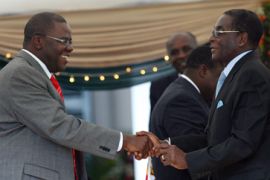MDC skips Zimbabwe cabinet meeting
Mugabe’s “unilateralism” prompts Tsvangirai supporters to shun cabinet meeting.

“The decision seeks to deny recognition of the prime minister as chair of cabinet when the president is away. Mr Mugabe has indicated he will not be present on Tuesday and hence the decision to move cabinet forward to today,” Khupe said.
Mugabe and Tsvangirai, once political rivals, set up a power-sharing government in February to stabilise Zimbabwe nearly a year after disputed polls plunged the country into further economic and political chaos.
‘Unilateralism’
Khupe said the decision to move the meeting “reflects unilateralism, disrespect, contempt and refusal to recognise the reality and the letter of the global political agreement.”
|
“For a long time we have remained the polite and subservient upholders of the global political agreement, against clear evidence of the absence of a reliable and honest partner.” Thokozani Khupe, Tsvangirai’s deputy |
“We will not attend an informal unilateral meeting,” she said.
Khupe said the MDC, which won parliamentary and the first round of presidential elections last year, was expressing its “constitutional right” to disengage, but would not say how long the “disengagement” would continue for.
“It’s time insanity and toxicity were removed” from the coalition government, she said.
Khupe cited the lack of progress on issues like Mugabe’s unilateral appointments of his colleagues to top posts and renewed arrests and violence against MDC parliamentarians and white farm invasions.
She also expressed disappointment at the issues that remained unresolved four months after the coalition government was formed.
“For a long time we have remained the polite and subservient upholders of the global political agreement, against clear evidence of the absence of a reliable and honest partner,” Khupe said.
Among the outstanding issues listed were the appointments of provincial governors and ambassadors, as well as the dispute over the appointments of the attorney-general and the central bank governor.